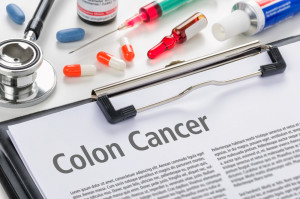Written by Greg Arnold, DC, CSCS. Researchers found that eating “heavily browned or blackened” meat significantly increased the risk of colon cancer by 125% compared to eating meat that was only “lightly browned or rare”
 According to the Centers for Disease Control, colorectal cancer is the second leading cause of cancer-related deaths in the United States and the third most common cancer in men and in women. There were 136,119 new cases and 51,813 deaths in the United States in 2013 (1) and 90% of all cases occur after the age of 50. There are several risk factors for colorectal cancer, including having inflammatory bowel disease and a family history of cancer. Lifestyle risk factors include a lack of regular physical activity, consuming a diet low in fiber and fruits & vegetables, being overweight/obese, and consuming alcohol and tobacco (2).
According to the Centers for Disease Control, colorectal cancer is the second leading cause of cancer-related deaths in the United States and the third most common cancer in men and in women. There were 136,119 new cases and 51,813 deaths in the United States in 2013 (1) and 90% of all cases occur after the age of 50. There are several risk factors for colorectal cancer, including having inflammatory bowel disease and a family history of cancer. Lifestyle risk factors include a lack of regular physical activity, consuming a diet low in fiber and fruits & vegetables, being overweight/obese, and consuming alcohol and tobacco (2).
Now results from a 2013 study (3) may cause the CDC to add well-done red meat to the list. In the study, researchers analyzed data on 1,062 subjects (518 men, 544 women) aged 52 to 72 with newly diagnosed (within 6 months) colon cancer and compared them with 1,645 subjects without a diagnosis of colon cancer and who participated in the National Cancer Institute and Centers for Disease Control and Prevention programs from 2003-2010 (4). Each subject completed 3 questionnaires:
- A Lifestyle Risk Factor Questionnaire, which asked questions about family history of colorectal cancer, lifestyle and behavioral risk factors.
- A Food Frequency Questionnaire, which asked about consumption of 175 foods as well as general dietary habits in the past year (or the year prior to colon cancer diagnosis).
- A Meat Preparation Questionnaire (5), which asked about portion sizes, consumption frequency, and cooking method concerning 10 meat groups. The questionnaire also contained color photographs and asked the subjects which picture most represents the appearance of the cooked meat they usually consumed.
The responses to the Meat Preparation Questionnaire were then used to calculate (6) estimated daily intake of two classes of proteins: heterocyclic amines and polycyclic aromatic amines. Both of these proteins are produced during the cooking of meat at high temperatures and whose increased intake has been associated with increased colon cancer risk (7, 8, 9). This calculation was called “total mutagenic intake”.
The researchers found a significant increase in colon cancer risk regarding the “doneness” of red meat. Specifically, subjects who cooked the outside to be “heavily browned/blackened” had a 125% increased risk of colon cancer compared to those who cooked the outside to be “lightly brown/rare” (p = 0.001). Regarding the “doneness” of the inside, those cooking to “heavily brown/blackened” had a 140% increased risk of colon cancer compared to cooking the inside to “lightly brown/rare” (p = 0.001). No significant difference was seen regarding white mean “doneness” on the outside (p = 0.59) or inside (p = 0.15).
For total mutagenic intake, those in the highest 25% of intake (exact levels not given) had a 130% increased risk of colon cancer compared to those in the lowest 25% (p < 0.0001). Total mutagenic activity was significant for red meat (p < 0.001) but not white meat (p = 0.07).
For the researchers, “our data add evidence supporting an increased risk of colon cancer associated specifically with dietary intake red meat-derived mutagens“ and that their study “further supports reducing red meat intake or reducing the doneness of consumed red meat as possible interventions for colon cancer risk reduction.”
Source: Helmus DS. Red meat-derived heterocyclic amines increase risk of colon cancer: a population-based case-control study. Nutr Cancer 2013;65(8):1141-50. doi: 10.1080/01635581.2013.834945. Epub 2013 Oct 29
Posted September 22, 2016.
Greg Arnold is a Chiropractic Physician practicing in Hauppauge, NY. You can contact Dr. Arnold directly by emailing him at PitchingDoc@msn.com or visiting his web site at www.PitchingDoc.com
References:
- “Colorectal cancer statistics” posted on the CDC website
- “What are the risk factors for colorectal cancer?” posted on the CDC website
- Helmus DS. Red meat-derived heterocyclic amines increase risk of colon cancer: a population-based case-control study. Nutr Cancer 2013;65(8):1141-50. doi: 10.1080/01635581.2013.834945. Epub 2013 Oct 29
- Li L, Plummer SJ, Thompson CL, Tucker TC, Casey G. Association between phosphatidylinositol
- Sinha R, Cross A, Curtin J, Zimmerman T, McNutt S, et al. Development of a food frequency questionnaire module and databases for compounds in cooked and processed meats. Mol Nutr Food Res. 2005; 49:648–655
- Martinez ME, Jacobs ET, Ashbeck EL, Sinha R, Lance P, et al. Meat intake, preparation methods, mutagens and colorectal adenoma recurrence. Carcinogenesis. 2007; 28:2019–2027
- Butler LM, Sinha R, Millikan RC, Martin CF, Newman B, et al. Heterocyclic amines, meat intake, and association with colon cancer in a population-based study. Am J Epidemiol. 2003; 157:434– 445
- Cotterchio M, Boucher BA, Manno M, Gallinger S, Okey AB, et al. Red meat intake, doneness, polymorphisms in genes that encode carcinogen-metabolizing enzymes, and colorectal cancer risk. Cancer Epidemiol Biomarkers Prev. 2008; 17:3098–3107
- Girard H, Butler LM, Villeneuve L, Millikan RC, Sinha R, et al. UGT1A and UGT1A9 functional variants, meat intake, and colon cancer, among Caucasians and African Americans. Mutat Res. 2008; 644:56–63
